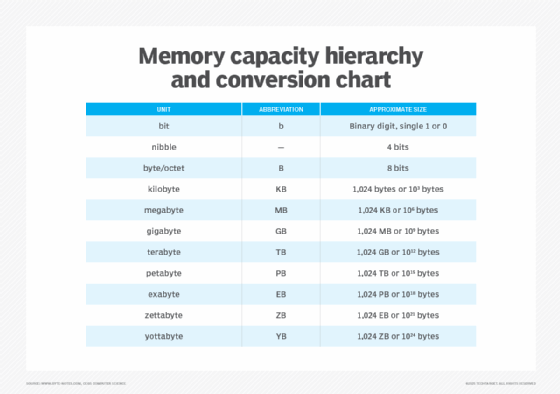kilobyte (KB or Kbyte) (original) (raw)
What is a kilobyte?
A kilobyte (KB or Kbyte) is a unit of measurement for computer memory or data storage.
Originally, a byte was considered a collection of 8 bits, the smallest number of bits that were able to express a number, letter or character within binary. A kilobyte is approximately 1,000 bytes (specifically, 2 to the 10th power or, in decimal form, 1,024 bytes).
The measurement kilobyte, along with other metric values, is determined by the International Electrotechnical Commission, an organization responsible for international standards and conformity assessment for computer and electronic technologies. It sets standards across technological industries including measurements for computer storage.
As a unit of measurement for computer information, a kilobyte stores data in binary form, the language used by most computers to interpret and synthesize information. The binary system in mathematics is used to translate regular numerals and characters to a system that a computer can understand and that can easily be transferred electronically. It is made up of groups of digits that are all either ones or zeros, and in combinations of sets of 8. The varying combinations of sequences of bits are codes that correlate to different letters and characters.
Usage
The term kilobyte is generally used to describe small amounts of data stored on computers as well as small files. Types of files with a smaller average file size that tend to be measured in kilobytes include short emails, images and short papers or Microsoft Word documents. The following are examples of small file sizes:
- A GIF may be around 800 KB.
- A JPEG may be around 100 KB.
- A short email may be around 5 KB.
- A PNG may be about 4.4 KB.
- A page of plain text may be about 2 KB.
Video files, webpages and MP3s tend to be larger and are more likely to be measured in megabytes (MBs).
Kilobyte vs. kilobit
Kilobytes are a larger unit of measurement than kilobits. A kilobit (Kb) is made up of 1,000 bits. Eight Kb make up one kilobyte. A kilobit is exactly one-eighth the size of a kilobyte, but their names are often mistakenly interchanged.

Memory capacity hierarchy and conversion chart
Base-10 vs. base-2
While most of mathematics is built on a base-10 system, which includes the numbers 0-9 and is also referred to as the decimal system, most technology, including the majority of computing, uses binary, or base-2, because it simplifies the process of sharing data between systems. Base-2 uses only two digits grouped in sets of eight instances of ones or zeros, also called bits. Each sequence of zeros and ones is a code that corresponds to a numeral, letter or other character allowing lengthy and complex data to be simplified.
This was last updated in February 2023
Continue Reading About kilobyte (KB or Kbyte)
- Kilo, mega, giga, tera, peta, exa, zetta and all that
- How many bytes for...
- kibi, mebi, gibi, tebi, pebi and exbi
 Types of bytes: Units of memory explained
Types of bytes: Units of memory explained  By: Kaitlin Herbert
By: Kaitlin Herbert  megabyte (MB)
megabyte (MB)  By: Robert Sheldon
By: Robert Sheldon  exbibyte (EiB)
exbibyte (EiB)  By: Stacey Peterson
By: Stacey Peterson  zebibyte (ZiB)
zebibyte (ZiB)